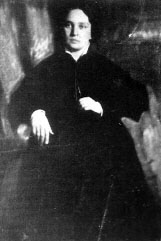Maria Yudina
This article needs additional citations for verification. (December 2015) |

Maria Veniaminovna Yudina (Template:Lang-ru, Mariya Veniaminovna Yudina; September 9 [O.S. August 28], 1899 – November 19, 1970) was a Soviet pianist.
Early life and education
Yudina was born to a Jewish family in Nevel, Vitebsk Governorate, Russian Empire. She studied at the Petrograd Conservatory under Anna Yesipova and Leonid Nikolayev. She also briefly studied privately with Felix Blumenfeld. Her classmates included Dmitri Shostakovich and Vladimir Sofronitsky.
Career
After her graduation from the Petrograd Conservatory, Yudina was invited to teach there, which she did until 1930, when she was thrown out of the institution because of her religious convictions and vocal criticism of the Soviet leadership. After being unemployed and homeless for a couple of years, Yudina was invited to teach the graduate piano course at the Tbilisi State Conservatory (1932–1933). In 1936, upon Heinrich Neuhaus's suggestion, Maria Yudina joined the piano faculty of the Moscow Conservatory, where she taught until 1951. From 1944 to 1960, Yudina taught chamber ensemble and vocal class at the Gnessin Institute (now Gnessin Russian Academy of Music). In 1960, Maria Yudina was thrown out of the Gnessin Institute because of her religious attitudes and her advocacy of modern Western music. She continued to perform in public, but her recitals were forbidden to be recorded. After an incident during one of her recitals in Leningrad, when she read Boris Pasternak's poetry from the stage as an encore, Yudina was banned from performing for five years. In 1966, when the ban was lifted, she gave a cycle of lectures on Romanticism at the Moscow Conservatory.
Yudina seems to have been Joseph Stalin's favorite pianist. According to a possibly apocryphal story, one night in 1944, Stalin heard a performance of Mozart's Piano Concerto No. 23 on the radio performed by Yudina, and asked for a copy. It was a live broadcast so officials woke up Yudina, drove her to a recording studio where a small orchestra had quickly been assembled, and made her record the concerto in the middle of the night; a single copy was pressed from the matrix and then presented to Stalin.[1] Despite the approval from Stalin, Yudina remained an uncompromising critic of the Soviet regime. She was awarded the Stalin Prize and donated its monetary portion to the Orthodox Church for "perpetual prayers for Stalin's sins". She died in Moscow in 1970.
Yudina's playing was marked by great virtuosity, spirituality, strength and intellectual rigor. However, her playing was also very individual in style and tone. Sviatoslav Richter said of her playing:
She was immensely talented and a keen advocate of the music of her own time: she played Stravinsky, whom she adored, Hindemith, Krenek and Bartók at a time when these composers were not only unknown in the Soviet Union but effectively banned. And when she played Romantic music, it was impressive – except that she didn't play what was written. Liszt's Weinen und Klagen was phenomenal, but Schubert's B-flat major Sonata, while arresting as an interpretation, was the exact opposite of what it should have been, and I remember a performance of the Second Chopin Nocturne that was so heroic that it no longer sounded like a piano but a trumpet. It was no longer Schubert or Chopin, but Yudina.[2]
Among her friends were Boris Pasternak (who did the first reading of his novel Doctor Zhivago at Yudina's apartment as early as February 1947), Osip Mandelstam, Mikhail Bakhtin, Pierre Suvchinsky, Dmitri Shostakovich, Pierre Boulez and Karlheinz Stockhausen.
Thanks to efforts of Yudina's friends in Russia, particularly Anatoly Kuznetsov, Yudina's letters and writings were published in the late 1990s and early 2000s. There were several attempts to complete the set of Yudina's recordings. Most of her recordings released on LPs in Russia are hard to obtain.
In literature
Yudina was portrayed by Aleksei Losev as a character in his novel Woman as Thinker.[3] The flawed heroine Losev created was a woman musician who spouted philosophy but held herself to lower standards. The novel has been criticized as an outlet for Losev's difficult relationship with Yudina, and as a poor example of his capabilities as a writer.[4] The novella caused the cessation of their friendship in 1934.[5][6][7]
In 1989 David Zane Mairowitz wrote The Stalin Sonata, a radio drama loosely based on an encounter between Stalin and Yudina.[8] It won a Giles Cooper Award.
References
- ^ Solomon Volkov (18 December 2007). Shostakovich and Stalin: The Extraordinary Relationship Between the Great Composer and the Brutal Dictato r. Knopf Doubleday Publishing Group. pp. 42–. ISBN 978-0-307-42772-4.
- ^ Monsaingeon, B. (2001). Sviatoslav Richter. Notebooks and Conversations. Faber & Faber Ltd. Pages 48-52
- ^ Šatskih, Aleksandra Semënovna (2007). Vitebsk: the life of art. Yale University Press. p. 308. ISBN 0300101082.
- ^ Perova, Natalii͡a; Tait, A. L. (1994). Booker Winners and Others. Glas new Russian writing. Vol. 7. Russlit. p. 227. ISBN 0939010437.
- ^ "Художественный мир прозы А.Ф. Лосева". Portal-slovo.ru. 2009-01-31. Retrieved 2016-11-23.
- ^ ":: Harmony :: International Music Magazine ::". Harmony.musigi-dunya.az. Retrieved 2016-11-23.
- ^ "Постигая прозу А.Ф.Лосева / Книга недели / Главная - Русский журнал". Russ.ru (in Template:Ru icon). Retrieved 2016-11-23.
{{cite web}}: CS1 maint: unrecognized language (link) - ^ "Drama Now - BBC Radio 3 - 1 August 1989 - BBC Genome". Genome.ch.bbc.co.uk. Retrieved 2016-11-23.
